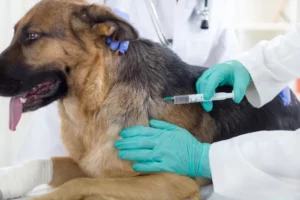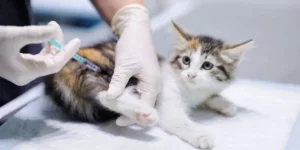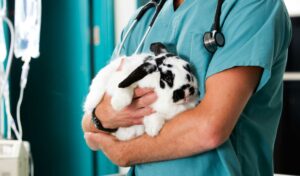Annual vaccinations for your pets are a vital factor in ensuring they live longer, healthier lives. Proper vaccination protocols and terminology can be a lot to comprehend if you have not been exposed to them, especially for a first time pet owner. Understanding the importance of having your pet properly vaccinated, what those vaccines prevent, how regularly they need administered, and the proper names are all factors that can help you maintain and monitor your pets overall health. Vaccination protocols vary based on species, geographical / environmental circumstance, as well as your pets specific lifestyle, and should always be discussed with your preferred veterinarian.
The Difference between Core and Non – Core Vaccinations
Core vaccinations are required and necessary for your pets wellbeing. Core vaccinations fully prevent your pets from contracting various potentially fatal diseases. Core vaccinations can vary based on your location. Depending on where you live your pet could be exposed to certain diseases more frequently than those living elsewhere.
Non – Core vaccinations are vaccines that are not required, but often suggested by veterinarians. Whether or not your pets need to receive these typically vary based on lifestyle and personal preference. Many places that house pets, especially boarding and day care facilities, may strictly require certain non – core vaccinations.
Proper Vaccinations for Dogs and Cats
Rabies vaccine is a core vaccination for both dogs and cats. If not vaccinated against, the disease Rabies is fatal in both dogs and cats, however it is completely preventable with annual vaccinations. Puppies should be given their first round of the Rabies Vaccinations as early as 4 months old, and kittens should receive it as early as 3 months old. Both dogs and cats will need to be vaccinated one year after they receive their first rabies vaccination. Annual Rabies Vaccination times and types will vary based on your veterinarian. The Rabies Vaccination is legally only allowed to be given by a licensed Veterinarian.
“DAP” or “DHP” is another core vaccination required for puppies and adult dogs. This vaccination prevents Canine Distemper, Hepatitis, and Parvovirus. This vaccination may also be a 4 or 5 way vaccination that includes important non – core vaccinations as well. You may see these under the name “DAPP” or “DA2PP” which includes the vaccination for Parainfluenza. This vaccine is most commonly known as the “Canine Distemper Vaccine”. This should be given to a puppy starting as early as 6 to 8 weeks old. Two more booster vaccines will then be required, each three weeks apart. An unvaccinated adult dog will need the vaccination once, then will need a booster vaccine after 3 weeks. Once the dog or puppy is considered “up to date” including all booster vaccines, they will continue to need this core vaccination annually every 1 – 3 years going forward. This vaccination does not need to be administered by a licensed veterinarian. We always recommend going to your veterinarian to have these vaccines done, as they are able to then provide proper records of the vaccine that was given as well as when the next one may be due. If you decide to do the vaccine yourself, we recommend you keep a record of the vaccine that was given, when it was given and when it is due next.
commonly known as the “Canine Distemper Vaccine”. This should be given to a puppy starting as early as 6 to 8 weeks old. Two more booster vaccines will then be required, each three weeks apart. An unvaccinated adult dog will need the vaccination once, then will need a booster vaccine after 3 weeks. Once the dog or puppy is considered “up to date” including all booster vaccines, they will continue to need this core vaccination annually every 1 – 3 years going forward. This vaccination does not need to be administered by a licensed veterinarian. We always recommend going to your veterinarian to have these vaccines done, as they are able to then provide proper records of the vaccine that was given as well as when the next one may be due. If you decide to do the vaccine yourself, we recommend you keep a record of the vaccine that was given, when it was given and when it is due next.
Bordetella is a non – core vaccine that prevents what is known as “Kennel Cough” in dogs. If you have visited Friendship APL, a boarding kennel, or any animal shelter, you have probably heard of that term. Kennel cough typically does not cause major complications, and will treat itself naturally, most of the time a short round of antibiotics will be given as well. Kennel Cough symptoms are similar to that of a human cold and can include coughing, sneezing and nasal discharge. The Bordetella vaccine does not fully prevent kennel cough, but it helps prevent and with the spread of the Kennel Cough disease. In a shelter environment this vaccination is necessary. Boarding facilities and other facilities that house pets also generally require the Bordetella vaccine. If you are looking to adopt a dog from a shelter and already have a resident dog at home, it is also highly recommended that your resident dog be up to date on its Bordetella vaccine. This vaccination does not need to be administered by a licensed veterinarian. We always recommend going to your veterinarian to have these vaccines done, as they are able to then provide proper records of the vaccine that was given as well as when the next one may be due. If you decide to do the vaccine yourself, we recommend you keep a record of the vaccine that was given, when it was given and when it is due next.
FVRCP which is commonly known as the “Feline Distemper Vaccine”, is a core vaccination for kittens and adult cats. This prevents Feline Panleukopenia, Rhinotracheitis, Calicivirus, and Feline Leukemia. This vaccination needs to be administered to kittens starting at 6 weeks of age. Two more booster vaccines will then be required, each three weeks apart. Adult cats will need the vaccine once, and  once again 1 year later. When properly administered, cats generally only need to get the vaccine every 3 years annually. This vaccination does not need to be administered by a licensed veterinarian. We always recommend going to your veterinarian to have these vaccines done, as they are able to then provide proper records of the vaccine that was given as well as when the next one may be due. If you decide to do the vaccine yourself, we recommend you keep a record of the vaccine that was given, when it was given and when it is due next.
once again 1 year later. When properly administered, cats generally only need to get the vaccine every 3 years annually. This vaccination does not need to be administered by a licensed veterinarian. We always recommend going to your veterinarian to have these vaccines done, as they are able to then provide proper records of the vaccine that was given as well as when the next one may be due. If you decide to do the vaccine yourself, we recommend you keep a record of the vaccine that was given, when it was given and when it is due next.
Proper Vaccinations for Rabbits and Ferrets
As a surprise to some, even the smallest of friends may need annual vaccinations to ensure their health and wellbeing too! Don’t let their size fool you, they have large personalities in small bodies, and also require annual veterinary care similarly to our larger furry friends.
RHDV2 is vaccination for Rabbits that prevents Rabbit Hemorrhagic Disease Virus (RHDV). RHDV is generally found in Europe, and therefore is more regularly vaccinated against there. However, with cases becoming more common throughout the United States, it is never a bad idea to ask your veterinarian if they recommend the vaccine for your rabbit. It is not a required core vaccine.  Domesticated rabbits should also receive annual wellness exams with a veterinarian that specializes in rabbits.
Domesticated rabbits should also receive annual wellness exams with a veterinarian that specializes in rabbits.
Ferrets, similar to dogs, must also be vaccinated annually against both Rabies and Canine Distemper. Both diseases are typically fatal in ferrets, therefore vaccines are often medically recommended, and should always be discussed with a veterinarian that specializes in ferrets. Ferrets should also receive annual wellness exams with your preferred veterinarian.
Conclusion
We are no stranger to the fact that providing good veterinary care to your pets is becoming increasingly more costly. Some people struggle with the decision to get their animals vet care or to pay bills. There are other resources that allow your animals to get the care they need without their owners having to break the bank. Before adding a pet into your home, looking into Pet Insurance options (https://friendshipapl.org/pet-insurance-is-the-way-to-go/), care credit and even look into scheduled vaccine clinics at your local pet stores (https://clinics.vippetcare.com/oh). These are all cost effective ways to afford your pets medical costs.
As soon as you invite a new pet into your home, it is crucial that you make sure you have a plan in place to provide annual veterinary care. This includes annual exams and keeping your pet up to date on vaccines. They serve a major importance in your pets living happy, healthy, long lives. Not getting your pets vaccinated not only puts them at risk, but puts other animals, especially puppies and kittens at risk for exposure to illness as well. In a shelter environment we are no strangers to any range of illness, unfortunately in some cases fatal illness. It’s so important that we all do our part for the health of all pets.




